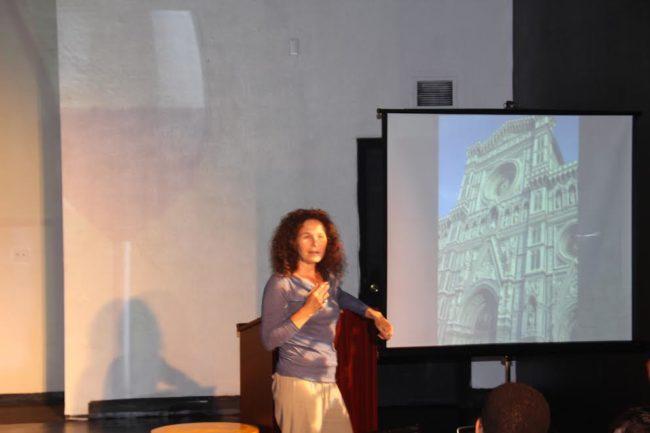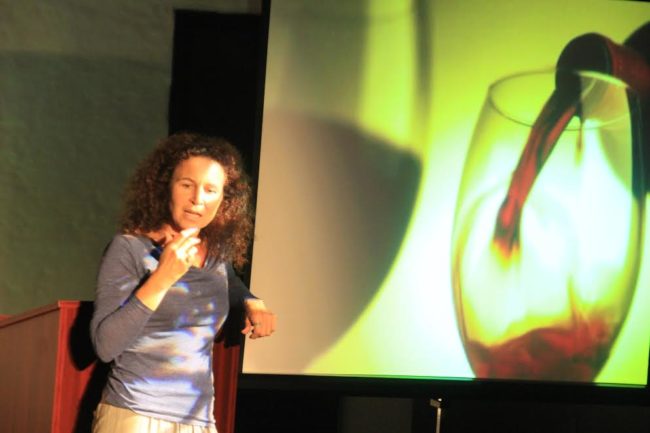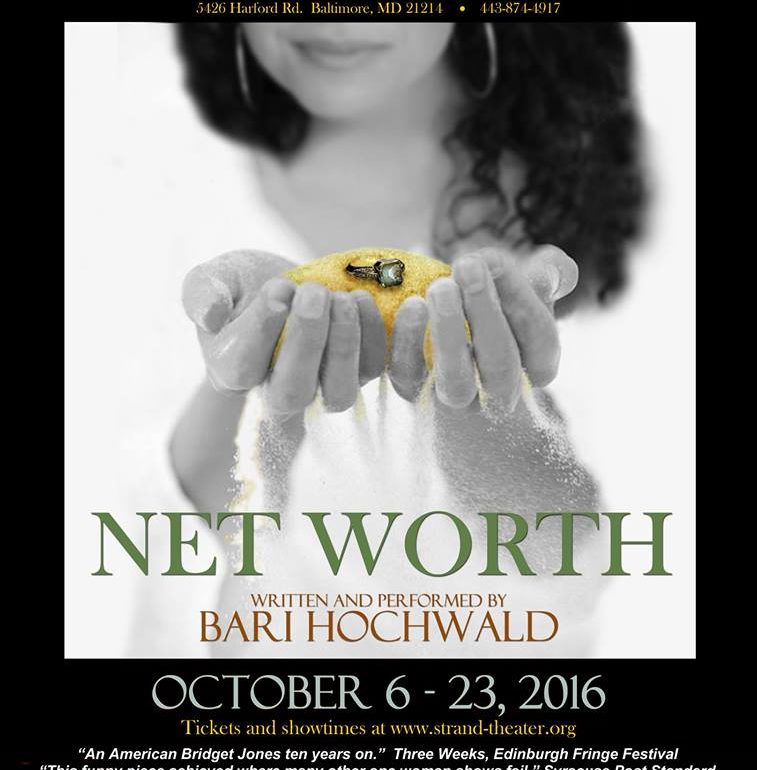Assets – Liabilities = Net Worth. Do you know your Net Worth? Bari does, down to the penny. But does knowing your Net Worth make provide you with happiness? Do things like job security, financial stability, and the almighty sense of safety in both of those elements really equate to happiness? In this emotionally entrenched one-woman exploration, which kicks off the 2016/2017 for Strand Theater Company in their brand new home on Harford Road, Net Worth delves headlong into the parallels of money marketing and the pursuit of sanity and happiness in the real world. Written and Performed by Bari Hochwald, this heartfelt, intimate tale invites the audience into Hochwald’s personal experiences as she struggles through a very relatable human experience: life’s pursuit of happiness. Are we conditioned to believe that only money and the securities thereof can truly provide this elusive feeling for us? Can money really buy happiness? Will your life be fulfilment unmet if you do not have financial stability, job security, and an excellent Net Worth? Peruse the answers to these questions and others like them is what awaits theatergoers in this intimate evening of personal experiences.
With a story that takes place in real-time, framed through the structure of a financial aid lecture wherein the audience are members attending this seminar and the performer is the speaker, but also in active memory, recollection, and recall, the use of lighting and projection become crucial hinge-pins of the performance’s success. Lighting Designer Lana Riggins and Projections Designer Maya Wilderberger work to focus the shifts in Hochwald’s tale to precision points of pivotal motion. Often times Hochwald flips so sharply from her calm and poised professional lecturing mannerisms into her frantic explosive emotional personality that the continuity of what’s happening in these moments would be lost entirely if it wasn’t for Riggins and Wilderberger’s clever designs. Riggins uses stark, sterile white lighting against Wilderberger’s bold black textual projections whenever Hochwald is addressing the audience as her business persona. The pair saturate the space with colors, both warm and cool, and Wilderberger expands the projections from the small pre-set screen to flood the walls during moments of memory reenactment or emotional confession. These shifts dramatically underscore the fluctuation in mood and help to make sense of both their frequency and their rapidity.

It is because of Wilderberger’s creative visuals, occasionally augmented by Sound Designer Max Bent (like during the tea room scene which features the introduction of ‘other characters’— all performed by Hochwald) that eases the heavy-hand of parallels that Hochwald is drawing to our attention. Each pinpoint in the financial “money-management” lecture draws immediately back to a personal experience, showing the clear relation or tie from the financial world to the world of personal happiness and at times the symbolism and relations thereof become a bit overdone. This is eased tremendously by the visual distractions, giving the audience a sense of personality behind the intimacy that Hochwald is importing into the performance.
This is not to say that Hochwald does not do a tremendously impressive job handling these shifts and switches; it in fact says quite the opposite. Watching Bari Hochwald flip like a switch from the polished, refined, and completely composed woman of business who is detached and aloof as she presents her lecture into a frenetically energized almost spastic emotional mess that is shredding apart at the seams before our eyes is an astonishing thing. The sincerity with which she presents her more intimate and vulnerable moments, in addition to her striking emotional presence in those scenes are the mark of a talented performer and gifted storyteller.
One of the most impressive ventures that Hochwald undertakes in her story is the creation of other characters. A one-person show can be challenging even at its most basic level, but the inclusion of ‘others’ adds to the challenge exponentially. Hochwald handles these others— real people from her life, including her Jewish and strongly-accented mother who has a handle on ‘momma guilt’— with a reverent panache. There is a distinguished physical shift in her body when she slips into the male characters, like the cocksure jerk with whom she finds herself on a date or the machismo-loaded Italian from Florence, signaling not only her awareness of the character shift but how different they are from her own stage presence. Hochwald also takes to affecting a different accent and speech pattern for each of the characters that enter her world, giving them a distinctive sound and voice.

The emotional clarity is one of Hochwald’s finest achievements in the piece. Though the segment in Florence lingers a bit longer than most of the other storytelling breakaways, it becomes so emotionally invested in exposing that point in her world that you don’t mind its length. The honest vulnerability expressed in true moments of doubt and fear, juxtaposed alongside the more humorous and jittery nature of things experienced earlier in the story are further testaments to Hochwald’s success with her craft as a performer, which all things considered in relation to the story brings about a beautiful irony to her tale.
Marking the show’s Mid-Atlantic premiere and the inaugural performance for Strand Theater’s first season in their new home, Net Worth is a solid production that you can take to the bank for a guaranteed good time, bit of life wisdom, and ultimately an evening of informative and emotionally guided entertainment.
Running Time: Approximately 70 minutes with no intermission
Net Worth plays through October 23, 2016 at Strand Theater Company— 5426 Harford Road in the Hamilton neighborhood of Baltimore, MD. For tickets call the box office at (443-871-1917 or purchase them online.

